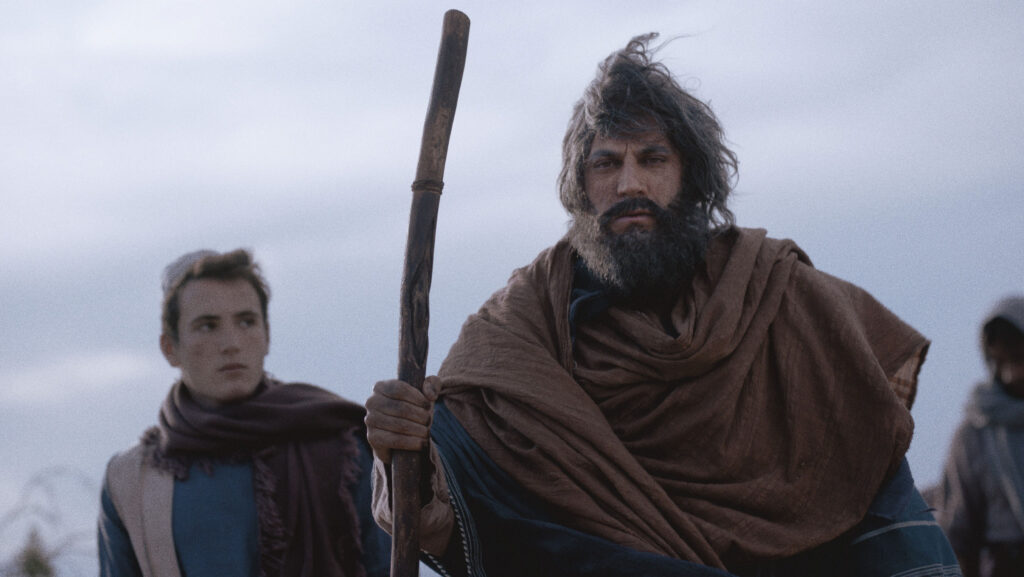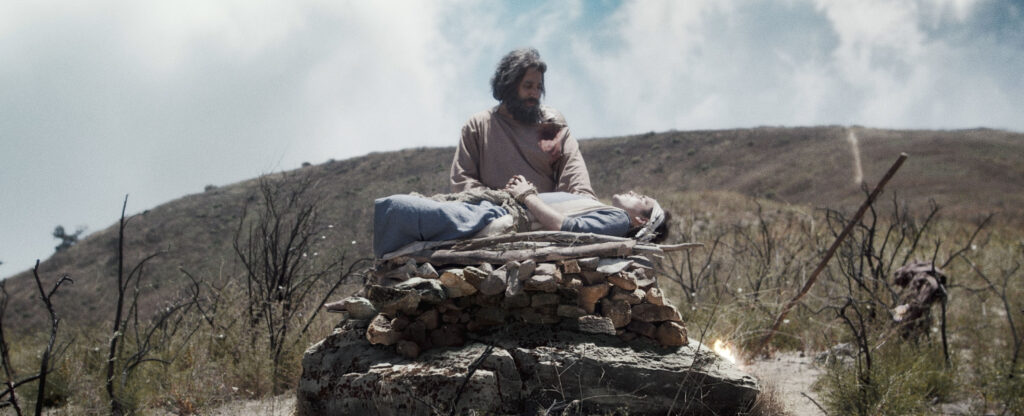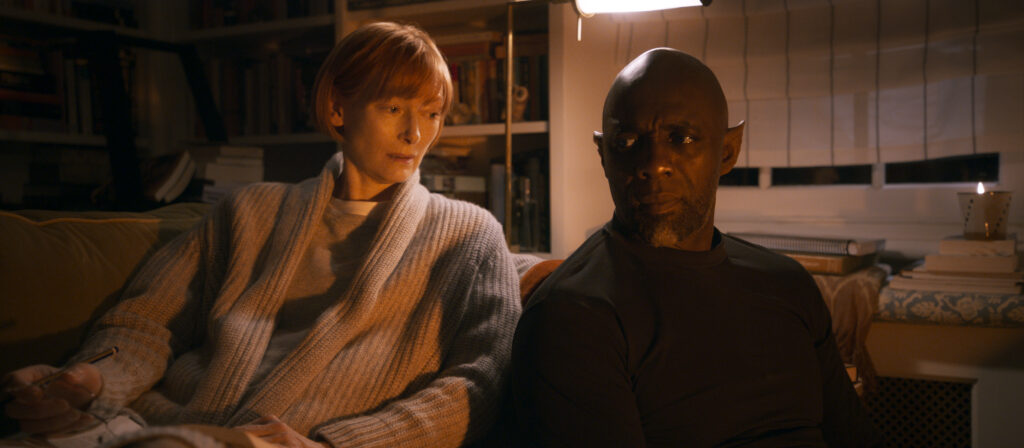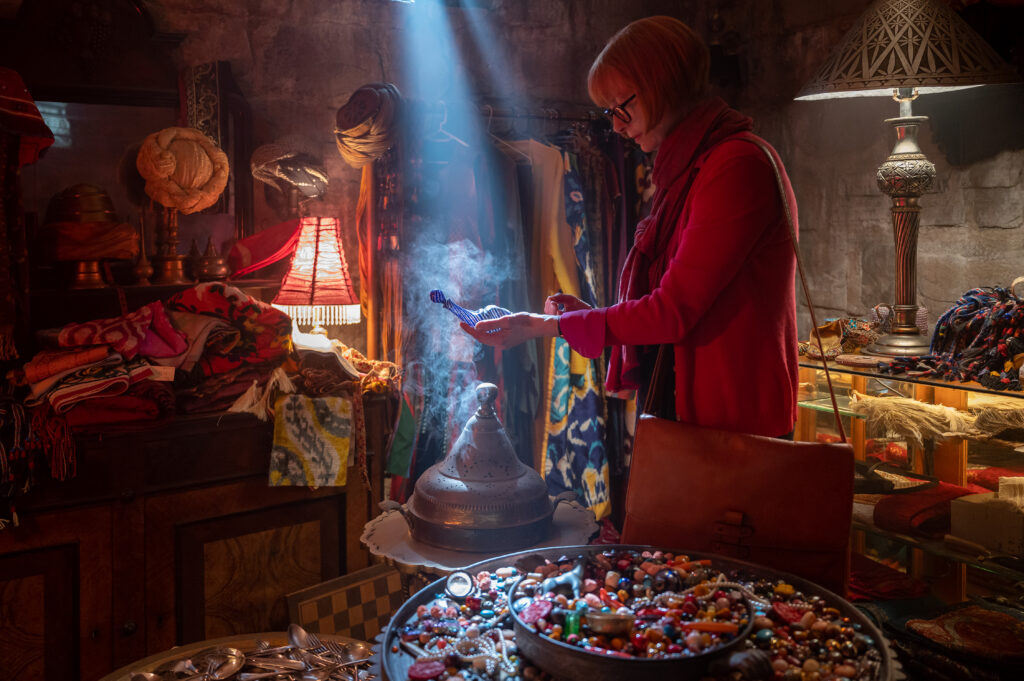April 7, 2023
by Carla Hay

Directed by David Helling
Culture Representation: Taking place in ancient Canaan and Moriah, the dramatic film “His Only Son” features a white, Middle Eastern and Egyptian cast of characters representing the working-class and middle-class from Judeo-Christian teachings.
Culture Clash: Religious prophet Abraham travels to Moriah after he gets a command from God to prove his loyalty by sacrificing the life of Abraham’s son Isaac.
Culture Audience: “His Only Son” will appeal primarily to people who are interested in faith-based movies that are dramatic movie versions of religious teachings.

“His Only Son” is a worthy, low-budget drama about religious figure Abraham, when he was called by God to make his greatest sacrifice: the life of his son. The depiction of Abraham’s troubled marriage gives this reverent movie some grit. “His Only Son” is a mixed bag, with some acting performances and technical aspects that are better than other acting performances and technical aspects in the movie. However, viewers who are inclined to watch faith-based films will probably find a lot to like about this earnest movie.
Written and directed by David Helling, “His Only Son” is truly a passion project, since Helling decided to become a filmmaker so he could make this movie and other movies about religious figures from the Christian Bible. Helling has said the production budget for “His Only Son” was only $250,000. That low budget can be seen in the movie’s hairstyling (wigs and fake beards that look cheap) and the small number of locations and cast members in the film. However, the movie’s cinematography is often striking, visually creative, and on par with movies that have production costs that are 100 times higher than what it cost to make “His Only Son.”
People who already know the story of Abraham’s journey from his land of Canaan (where he is the leader) to Moriah to sacrifice his son Isaac won’t find any surprises in “His Only Son,” regarding the outcome of this journey. The movie also has faithful depictions of the Judeo-Christian teachings of Abraham frequently having visions where he communicates with God and gets commands and prophecies from God. What might surprise people is how the movie portrays how all of these visions took a serious toll on Abraham’s marriage.
“His Only Son” frequently shows flashbacks of Abraham’s life while Abraham (played by Nicolas Mouawad) goes on the journey to Moriah with Isaac and two other young men from Canaan: loyal Kelzar (played by Ottavio Taddei) and skeptical Eshcolam (played by Nicolai Perez, also know as Reji Lukai). Kelzar is son of Abraham’s chief servant Eliezer (played by Luis Fernandez-Gil), who offered Kelzar to be a part of this travel group.
The trip to Moriah takes three days by walking. “His Only Son” has a subplot about this group facing a moral dilemma concerning a severely wounded man (played by Matthew Dorio) and his kidnapped young adult daughter (played by Alexandria Lior), who have been attacked by four marauders (played by Kevin Kapellas, Steve Judkins, Nathan Tetreault and Mario Dagget). “His Only Son” doesn’t make too much of a detour in this subplot, but it seems like it was put in the movie to fill up time and so the story would have some action-oriented suspense.
The flashbacks to Abraham’s life go as far as back 40 years before he took this journey to Moriah. Abraham has been having visions of God (played by Daniel da Silva), who promised Abraham that he would rule over Canaan and pass on this legacy to his children. The problem is that Abraham’s wife Sarah (played Sara Seyed) has spent several years of their marriage trying to get pregnant, to no avail. Canaan’s barren land has made the couple’s financial future very insecure. And so, at Sarah’s urging, Abraham and Sarah move to Egypt for more fruitful land.
As the years go by and Sarah still appears to be infertile, she becomes tired of Abraham telling her to be patient. Abraham repeatedly reminds Sarah that God told Abraham that Abraham would have a son. Sarah begins to panic when she approaches the age range when most women are menopausal. She thinks the prophecy that Abraham will have a son is God’s way of saying that Abraham will have a child with another woman, so she offers her maid Hagar (played by Eta Pico) to be Abraham’s other “wife.”
Sarah regrets the decision after Hagar gets pregnant. Sarah is angry and ashamed, because she thinks that she has lost respect from Hagar and others in the community who know about this arrangement. Sarah verbally lashes out at Abraham for accepting Sarah’s insistent offer to get another woman pregnant so that Abraham can have an heir. Abraham isn’t wrong when he reminds Sarah that it was all her idea for him to impregnant Hagar, because Sarah lost faith that Sarah would get pregnant.
It’s not spoiler information to say that Sarah gets pregnant and gives birth to Isaac. It’s necessary to mention that information in this review because “His Only Son” mishandles the subplot about Hagar getting pregnant. Hagar and her pregnancy are not seen or mentioned in the movie again after Sarah gives birth to Isaac. It’s a plot hole that ignores the religious teaching that Hagar gave birth to Abraham’s first son Ishmael, who lived to a very old age. Therefore, it’s not entirely accurate to name this movie “His Only Son.”
As the Abraham character, Mouawad gives a solid performance in portraying someone with strong faith that still gets tested. Seyed’s depiction of Sarah can get a tad too melodramatic, but she’s a scene stealer who grounds the movie in the realism that it would not be easy to be married to a prophet who claims to have a direct line of communication with God. It’s also refreshing that “His Only Son” does not portray all of the women in the film as passive or subservient to men (as many Bible-oriented movies tend to do), since Sarah has a very strong-willed and opionionated personality. The rest of the cast members are serviceable in their roles.
“His Only Son” occasionally plods along at a dull pace. And some of the dialogue is terribly simplistic. However, the main characters are compelling, and the movie does a very good job of showing people’s different perspectives of what it means to have “faith in God.” Helling also admirably didn’t try to make these characters sound British or American (another historical inaccuracy that many Bible-based movies have) and instead had the characters in “His Only Son” talk with historically accurate Hebrew or Egyptian accents. It’s a movie that certainly makes the most out of its low budget and delivers a capable story about one of the most lauded religious figures of all time.
Angel Studios released “His Only Son” in U.S. cinemas on March 31, 2023.


